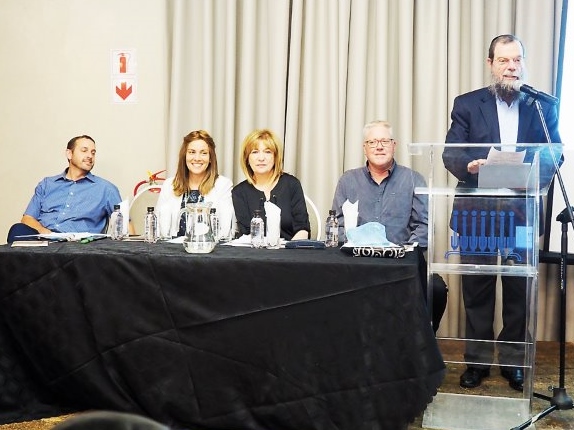
News

How to create the ‘unselfie’ generation
GILLIAN KLAWANSKY
So says Gavin Keller, education guru and the Chief Executive of Cape Town’s Sun Valley group of schools. He was part of a four-person panel moderated by Rabbi Yossy Goldman at Sydenham Shul’s big learning launch last week.
Panellists addressed changes in education, how children and adults learn, and why it’s important to integrate new-age thinking with age-old wisdom.
Keller argued that we need to combine new and old educational paradigms to develop critical thinkers. He referred to the old style of education as “post-box schooling”.
“This is when they arrive with the curriculum, normally designed by the government, and they shove in the work as fast as possible into the post-box,” he said. “At the end of the school term, they ask you to open that post-box and spew it out, and then they judge you according to how well you did. Then they give you a rating: bright, average, or dull. While that’s the old style, it’s unfortunately still happening in about 96% of South African schools.”
Keller believes in constructing the classroom around what’s happening in the child’s life.
Tracking matriculants from 1966 to 2016, scientists have discovered that young people are taking longer to reach adulthood in this new “selfie” generation which arose with the advent of smartphones. “These devices are never going away, so we need to teach children how to use them,” said Keller. “We must teach children in the 21st century how to apply all that incredible wisdom that we’ve had – the training and teaching we’ve had on kindness, gratitude, suffering, and getting back up after failure – to the new age of learning.
“Thinking won’t happen if you don’t play,” he added. “If you don’t take time out, go walking outside, go to gym, or rest, you will never be bright. The brain is totally dependent on you resting to make neural pathways. No one has ever had their “aha!” moment sitting at their desks.
“We want to take working memory and put it to a place where it can be mindful and relaxed, so we can ponder that material.” That’s why Keller’s schools have eliminated homework. “Children need time to go home and rest their brains so that everything they’ve learned at school can be filed. Otherwise we’re just shoving it into the post-box.”
Yet the problem with the selfie generation is that when a child is relaxing, they check their phones to see how many likes they got on their Instagram photo. “This group is suffering from the highest levels of depression we’ve ever had, and feeling disconnected. We must start getting children to develop, think, and reason, and then go home and continue the debate with their parents around the supper table. When we get that right, then we’ll have the unselfie me.”
Discussing IQ and EQ, Shelley Freinkel, the Head of King David Senior Primary School Linksfield, said emotional intelligence was the most important factor in determining success. Academic intelligence, while valuable, is not the be all and end all. “Historically, especially in our community, the premise has generally been to achieve the highest marks, go to university, and get a degree. If you don’t fit that mould, the perception is that your children are destined for a lifetime of mediocrity. Yet, success in life and business is a matter of EQ – imagination, emotion, relationships, and character, rather than just raw intelligence. We’re working to create environments that integrate multiple intelligence, and develop well-rounded children.
“Today’s workplace demands people who are empathetic, creative thinkers, problem solvers, and collaborative team players. All schools need to look at the whole child, and direct the child beyond academics, although never neglecting diagnosed barriers to learners which can be remediated. Social and emotional learning must be taken into core instruction. Educators need parents to partner in that vision, to nurture and to celebrate their children’s passions and talents beyond the academic curriculum.”
Rebbetzin Zeesy Deren, the Director of the Sinai Academy International School and Cape Town Torah High, as well as the founder of the Echad Institute for Mindfulness and Meditation, explained how her schools are using unconventional, innovative teaching methods.
They personalise learning. “We look at the individual child, and almost design a personal curriculum for each of them. There’s no more cookie-cutter approach. We’re presenting the child with choices on how and what they learn. This empowers them to own their learning.”
Children and teachers take part in projections and reflections, she says. Children have checklists on what they must accomplish, and they reflect on what they’ve learned, while teachers keep journals, and provide weekly feedback on each child.
“Different age groups are also taught together at times, resembling normal life.” Peer learning is done where the younger child learns from the older child, and the older child gains confidence. “We teach kids conflict resolution, so they learn how to communicate early on.” Ultimately these schools reduce the pressure. “Let the child think and be, because we want them to actually learn,” said Deren, echoing Keller’s words.
“Based on the teachings of the Rebbe, classes have a moment of silence each morning to think of something higher than themselves, in a quiet space where the brain is clear,” she said. “We teach Judaism from inside out, and give kids space to ask questions.”




